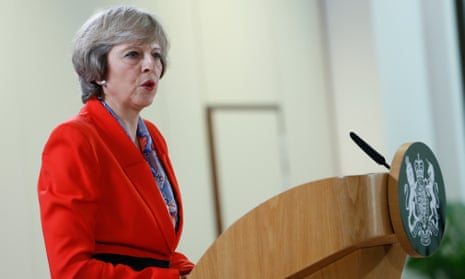Theresa May has been warned to expect a “full-blown constitutional crisis” unless agreement on the terms of Brexit can be reached between the government and the UK’s devolved administrations.
The stark prediction comes as the prime minister hosts talks on Monday with the leaders of Scotland, Wales and Northern Ireland for the first time since the UK voted to leave the EU on 23 June.
In a report published on Monday, the Institute for Government said unless all four leaders agree on the “core planks” of the UK’s negotiating position before May triggers article 50, formally starting the Brexit process, the result could be “a serious breakdown in relations between the four governments and nations of the UK”.
May is preparing to offer Scotland’s first minister, Nicola Sturgeon, the Welsh first minister, Carwyn Jones, and Northern Ireland’s first minister, Arlene Foster, and her deputy, Martin McGuinness, a “direct line” to the Brexit secretary, David Davis, to allow them to help shape Britain’s EU exit strategy.
But the offer is made against a background of continuing clashes between May and Sturgeon over who has a more substantial mandate regarding Scotland’s relationship with the UK and Europe, and as the devolved administration leaders present an increasingly united front against Westminster.
Ahead of the joint ministerial committee (JMC) meeting on Monday, in a letter to May, Sturgeon formally endorsed a proposal from Jones that any planned negotiating package should be subject to a vote in all four UK parliaments and assemblies.
Anticipating that the three devolved governments would seek such a vote, the Institute for Government noted that although the UK parliament remains sovereign and could legally ignore the views of Holyrood, Cardiff Bay and Stormont, this would be a “reckless strategy for a government committed to the union”.
The organisation warned that forcing the devolved administrations to comply “would seriously undermine relationships between the four governments, and increase the chances of Scottish independence and rifts in Northern Ireland’s fragile power-sharing arrangements”.
May will make the offer of a new official forum, which would be chaired by Davis and meet at least twice before the end of the year, and insist that “it is imperative that the devolved administrations play their part in making [Brexit negotiations] work.”
By placing future discussions on a formal footing, May will say she is giving the Scottish, Welsh and Northern Irish leaders “the chance for them all to put forward their proposals on how to seize the opportunities presented by Brexit and deliver the democratic decision expressed by the people of the UK”.
Sturgeon has already said she will push for substantial additional powers for Holyrood as part of article 50 negotiations, including over international trade deals and immigration.
But this appeared to be rebuffed by Davis during a visit to Scotland on Friday, when he insisted that any arrangements to leave the EU would be a “United Kingdom deal”.
A Downing Street source said while the JMC had existed since devolution, the discussions over Brexit had provided a new impetus for its work.
“It will be the formal forum in which the devolved administrations feed in their ideas and make their case on what is important around Brexit,” the source said.
While the relevant secretaries of state for Scotland, Wales and Northern Ireland would continue to speak for their administrations in parliament, JMC meetings are “a chance for the devolved administration leaders as well,” the source said. “They do have a voice that needs to be heard and a role to play. And as the prime minister has repeatedly made clear, we’re leaving the EU as the UK.”
May is also expected to discuss the government’s position on the Brexit strategy at the JMC and say that contrary to some speculation, no final decisions have been taken and how the UK leaves the EU will not boil down to a binary choice.
Although May called for a “new grown-up relationship” between Westminster and the devolved administrations ahead of the meeting, the war of words between the Scottish and UK governments has continued since Thursday, when Sturgeon published a draft bill on a second independence referendum.
The Scottish National party leader said she had a clear mandate to hold a second vote, because the SNP had been elected in May on a manifesto commitment to do so, should there be a “significant and material change in the circumstances that prevailed in 2014, such as Scotland being taken out of the EU against our will”.
Sturgeon has promised to work with progressive parties and Conservative moderates across the UK to seek to avert a hard Brexit and bring forward proposals to protect Scotland’s place in the single market, even if the rest of the UK leaves.
However, a Number 10 spokesperson immediately dismissed the plan for a second vote. “The prime minister and the government does not believe that there is a mandate for one,” they said. “There was one only two years ago. There was an extremely high turnout and there was a resounding result in favour of Scotland remaining in the UK.”
